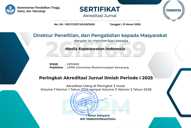Self-Efficacy in Disaster Preparedness: Insights from Nurses in Emergency and Intensive Care Units
(1) Universitas Muhammadiyah Semarang
(2) RSUD Kota Yogyakarta
(3) National Taipei University of Nursing and Health Scieneces
(*) Corresponding Author
Abstract
Keywords
Full Text:
PDFReferences
Khairina I, Nelwati, Maisa EA. Self Efficacy and Nurses’ Disaster Competency in Disaster Preparedness Management. Malaysian Journal of Medicine and Health Sciences 2023;19:310–4. https://doi.org/10.47836/MJMHS.19.3.40.
Wang Y, Liu Y, Yu M, Wang H, Peng C, Zhang P, et al. Disaster Preparedness Among Nurses in China: A Cross-Sectional Study. J Nurs Res 2023;31:E255. https://doi.org/10.1097/JNR.0000000000000537.
Labrague LJ, Kamanyire JK, Achora S, Wesonga R, Malik A, Al Shaqsi S. Predictors of disaster response self-efficacy among nurses in Oman. International Journal of Disaster Risk Reduction 2021;61. https://doi.org/10.1016/J.IJDRR.2021.102300.
Jonson CO, Pettersson J, Rybing J, Nilsson H, Prytz E. Short simulation exercises to improve emergency department nurses’ self-efficacy for initial disaster management: Controlled before and after study. Nurse Educ Today 2017;55:20–5. https://doi.org/10.1016/J.NEDT.2017.04.020.
Emaliyawati E, Ibrahim K, Trisyani Y, Mirwanti R, Ilhami FM, Arifin H. Determinants of Nurse Preparedness in Disaster Management: A Cross-Sectional Study Among the Community Health Nurses in Coastal Areas. Open Access Emerg Med 2021;13:373–9. https://doi.org/10.2147/OAEM.S323168.
Zhang J, Yang L, Cao X, Ren Y, Han X, Zang S, et al. Assessment of disaster preparedness and related impact factors among emergency nurses in tertiary hospitals: descriptive cross-sectional study from Henan Province of China. Front Public Health 2023;11. https://doi.org/10.3389/FPUBH.2023.1093959/PDF.
Ediz Ç, Yanik D. Disaster preparedness perception, pyschological resiliences and empathy levels of nurses after 2023 Great Turkiye earthquake: Are nurses prepared for disasters: A risk management study. Public Health Nurs 2024;41:164–74. https://doi.org/10.1111/PHN.13267.
Songwathana P, Timalsina R. Disaster preparedness among nurses of developing countries: An integrative review. Int Emerg Nurs 2021;55. https://doi.org/10.1016/J.IENJ.2020.100955.
Amberson T, Wells C, Gossman S. Increasing Disaster Preparedness in Emergency Nurses: A Quality Improvement Initiative. J Emerg Nurs 2020;46 5:654–66521. https://doi.org/10.1016/J.JEN.2020.05.001.
Yunanto RA, Rondhianto, Setioputro B, Haristiani R. The Self-Efficacy and Disaster Preparedness of Coastal Nurse in Jember. Jurnal Kesehatan Dr Soebandi 2023;11:113–9. https://doi.org/10.36858/JKDS.V11I2.442.
Li HY, Bi RX, Zhong QL. The development and psychometric testing of a Disaster Response Self-Efficacy Scale among undergraduate nursing students. Nurse Educ Today 2017;59:16–20. https://doi.org/10.1016/J.NEDT.2017.07.009.
Kim SH. A Psychometric Validation of the Korean Version of Disaster Response Self-Efficacy Scale for Nursing Students. Int J Environ Res Public Health 2023;20. https://doi.org/10.3390/IJERPH20042804.
Murphy JP, Kurland L, Rådestad M, Magnusson S, Ringqvist T, Rüter A. Emergency department registered nurses overestimate their disaster competency: A cross-sectional study. Int Emerg Nurs 2021;58. https://doi.org/10.1016/J.IENJ.2021.101019.
Koçak HS, Kaplan Serin E. Are Nurses Ready for a Disaster in Turkey? A Hospital Case. Disaster Med Public Health Prep 2023;17. https://doi.org/10.1017/DMP.2023.100.
Suaida D, Suaida DH, Handayani D, Suryanto S. Factors That Affect the Disaster Preparedness of Emergency Nurses in Public Health Center. Jurnal Aisyah : Jurnal Ilmu Kesehatan 2022;7:231–6. https://doi.org/10.30604/jika.v7i1.905.
Al-Hunaishi W, Hoe VCW, Chinna K. Factors associated with healthcare workers willingness to participate in disasters: a cross-sectional study in Sana’a, Yemen. BMJ Open 2019;9:e030547. https://doi.org/10.1136/BMJOPEN-2019-030547.
Ahmadi AZ, Ghavami V, Shabanikiya H. Nurses’ Preparedness for Disasters in a Crisis-Stricken Country: A Case Study in Afghanistan, in 2020. Health in Emergencies & Disasters Quarterly 2021;7:49–56. https://doi.org/10.32598/HDQ.7.1.259.4.
Choi WS, Hyun SY, Oh H. Perceived Disaster Preparedness and Willingness to Respond among Emergency Nurses in South Korea: A Cross-Sectional Study. Int J Environ Res Public Health 2022;19. https://doi.org/10.3390/IJERPH191811812.
Sanjaya W. The Effect of Self-Efficacy, Caring and Organizational Commitment on Disaster Preparedness of Nurses. KnE Life Sciences 2022;2:113–21. https://doi.org/10.18502/KLS.V7I2.10294.
Kim SH. A Psychometric Validation of the Korean Version of Disaster Response Self-Efficacy Scale for Nursing Students. Int J Environ Res Public Health 2023;20. https://doi.org/10.3390/IJERPH20042804.
Article Metrics
Abstract view : 516 timesPDF - 16 times
DOI: https://doi.org/10.26714/mki.7.3.2024.186-192
Refbacks
- There are currently no refbacks.
Copyright (c) 2024 Aric Vranada, Ferri Anggriawan, Tsae-Jyy Wang

This work is licensed under a Creative Commons Attribution 4.0 International License.
This journal is indexed by:
Kedungmundu Raya No. 18 Semarang NRC Building Universitas Muhammadiyah Semarang
Phone: 02476740287
Fax: 02476740287
Email: mki@unimus.ac.id





















